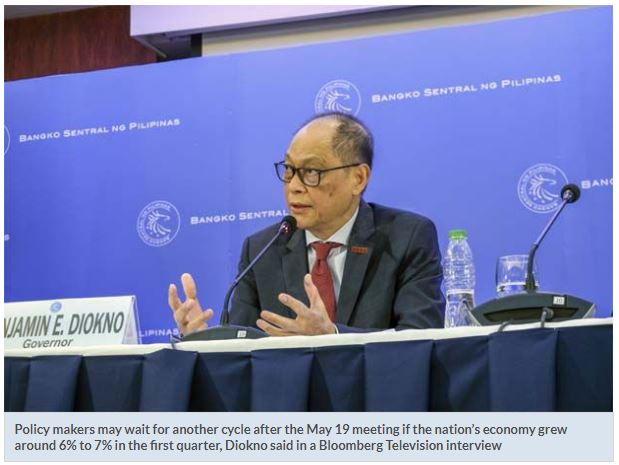Philippines may consider rate increase in June, says Diokno
MANILA: The Philippine central bank may consider raising its key interest rate in June, according to governor Benjamin Diokno.
Policy makers may wait for another cycle after the May 19 meeting if the nation’s economy grew around 6% to 7% in the first quarter, Diokno said in a Bloomberg Television interview with Kathleen Hays, Shery Ahn and Paul Allen late Monday in New York.
“We have another meeting in June. And maybe that’s the time when we will consider the increase in policy rate.”
The governor previously said Bangko Sentral ng Pilipinas (BSP) may begin rate hikes in the second half of this year, and that an increase to 2.5% to 2.75% as part of a normalisation process is “reasonable.”
BSP is among Asian central banks that have yet to jump onto the global rate hike cycle led by the Federal Reserve (Fed). Yet, markets are starting to account for rising price expectations and more aggressive policy action as the inflation wave reaches the region.
“We can afford to wait as to what will be the move of the Fed in the next two meetings,” Diokno said during Monday’s interview.
“Right now, there is no evidence of second round effects on the demand side.”
While the BSP has begun withdrawing some pandemic-era accommodation, it has maintained that raising the benchmark rate isn’t the appropriate tool to address supply-driven price pressures. Consumer prices in March rose 4% – the upper end of the central bank’s 2% to 4% target band.
Consumer-price rise will average within BSP’s target range next year after a possible breach this year, Diokno said.
“Yes,” the governor said when asked if inflation’s return to goal incorporates two to three rate hikes, adding that it also assumes oil prices will “normalise next year.”
The monetary authority has kept interest rates at a record-low 2% since November 2020 to support the economy’s recovery from the pandemic.
Standing pat on rates has pushed the peso lower against the dollar. The local currency has lost 2.7% against the greenback so far this year. — Bloomberg


 English
English




